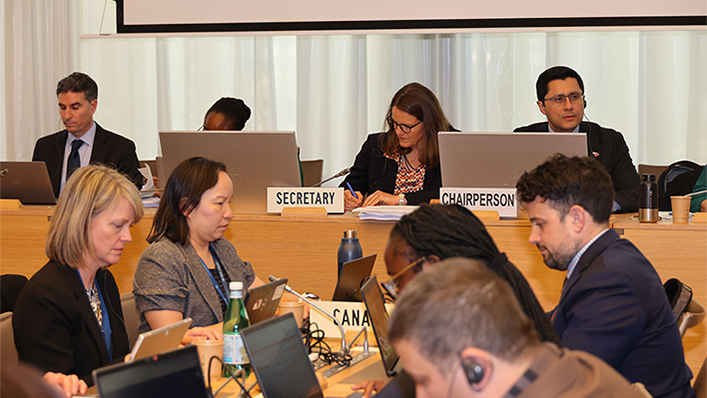
Every four years, WTO members review how they are implementing the SPS Agreement. The proposed process for the Sixth Review was discussed and adopted by members at an SPS Committee meeting in November 2023. Proposals covering diverse topics such as modern challenges, regionalization, technology, transparency and follow-up to the MC12 SPS Declaration work programme were discussed, paving the way for an extensive agenda for the Committee’s work in 2024.
The cooperation with Codex, the International Plant Protection Convention (IPPC), the World Organisation for Animal Health (WOAH) and other observer organizations was also addressed as part of a process expected to conclude in March 2025.
Members acknowledged the significance of the MC13 S&DT Declaration and emphasized the need for collaborative efforts with relevant committees, namely the TBT Committee and the Committee on Trade and Development in Special Session, to effectively operationalize its provisions.
While specific guidance on operationalization was not provided at this stage, technical assistance and S&DT will form integral components of the Sixth Review work. Members also called for increased participation of developing economies and least developed countries, who would be the main beneficiaries of the initiative.
Regarding the MC12 SPS Declaration Work Programme on responding to modern SPS challenges, many members regretted that, despite the finalized draft report prepared for MC13, consensus remained elusive. Members emphasized that the text of the report, reflecting discussions within the Work Programme, should not be subject to reopening.
Specific trade concerns
Members discussed 49 specific trade concerns (STCs), four of which were raised for the first time. New STCs dealt with requirements pertaining to certificates of conformity for processed food products, delays in the publication of requirements to reopen market access, and delays in authorizations for certain enterprises and products.
Other concerns addressed pesticide residues, contaminants, endocrine disruptors, veterinary medicinal products, and challenges related to SPS procedures and import authorizations. The intensive discussions reflected the commitment of members to ensuring compliance and fostering smoother trade relations.
Various animal diseases, including Highly Pathogenic Avian Influenza (HPAI), African Swine Fever (ASF) and Bovine Spongiform Encephalopathy (BSE), continued to command attention, prompting discussions on surveillance, monitoring plans and adherence to WOAH standards. One concern relating to a member’s import restrictions due to BSE was reported as resolved.
The list of STCs discussed during the meeting is available here.
Other issues
Updates on SPS activities in Ukraine and import restrictions on Japanese food products due to the Fukushima nuclear accident highlighted the importance of robust information exchange among members. Additionally, Ecuador and Ukraine shared insights into their utilization of phytosanitary e-certificates.
In addition to the formal Committee meeting, members actively engaged in informal discussions. They also took part in a workshop on transparency, a side event introducing the AGRINFO information programme on new EU policies organized by the European Union and the Committee Linking Entrepreneurship-Agriculture-Development (COLEAD), and a side event organized by the Standards and Trade Development Facility to celebrate Francophonie Day, featuring remarks by WTO Deputy Director-General Jean-Marie Paugam.
Next steps
The Committee’s future agenda includes a thematic session on digital tools during the next meeting scheduled for the week of 24 June 2024, underlining the ongoing commitment to addressing evolving challenges in global trade.
Share
Reach us to explore global export and import deals